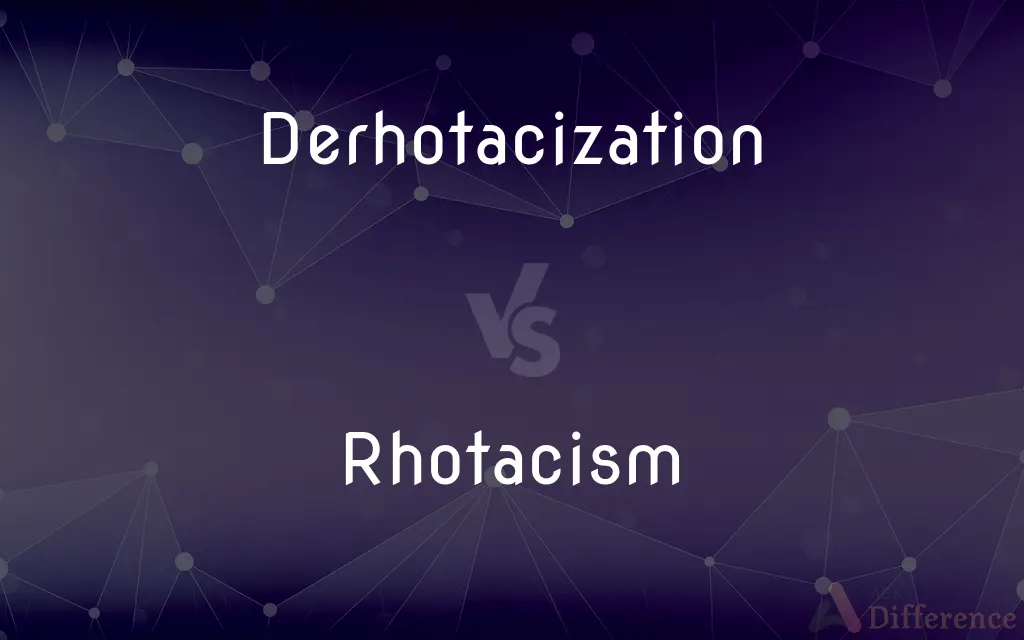Derhotacization vs. Rhotacism — What's the Difference?
Edited by Tayyaba Rehman — By Fiza Rafique — Updated on April 27, 2024
Derhotacization involves the loss or weakening of the 'r' sound in speech, while rhotacism is the excessive or mispronounced 'r' sound.

Difference Between Derhotacization and Rhotacism
Table of Contents
ADVERTISEMENT
Key Differences
Derhotacization is characterized by the reduction or omission of the 'r' sound in certain linguistic environments, typically observed in some dialects of English. On the other hand, rhotacism refers to the exaggeration or misarticulation of the 'r' sound, which can occur in various languages and is often perceived as a speech impediment.
In terms of phonetics, derhotacization might result in sounds that are less rhotic or entirely non-rhotic, affecting the quality of vowels preceding or following the traditional 'r' sounds. Whereas rhotacism leads to a pronounced rhoticity that can alter the intended sounds of words, making them sound overly harsh or incorrectly articulated.
Linguistically, derhotacization can be part of a regional accent or dialect, such as in some forms of British English where the 'r' is not pronounced unless followed by a vowel. Conversely, rhotacism might be considered a disorder in cases where it significantly affects intelligibility and deviates from the linguistic norms of a community.
Social perceptions also differ; derhotacization may be seen as a feature of prestige in certain English dialects, adding a level of linguistic identity. In contrast, rhotacism may sometimes carry negative connotations, particularly if it's viewed as a hindrance to clear communication.
The treatment and attention given to these phenomena vary; derhotacization is often unaddressed in regions where it is a normative part of speech, while rhotacism may be targeted in speech therapy to correct or modify the pronunciation towards a standard form.
ADVERTISEMENT
Comparison Chart
Definition
Reduction or loss of 'r' sound
Exaggeration or mispronunciation of 'r' sound
Common in
Certain English dialects
Various languages, often as a speech disorder
Phonetic Impact
Leads to non-rhotic speech
Results in hyper-rhotic speech
Social Perception
Sometimes seen as prestigious
Often viewed negatively
Treatment
Generally not corrected
Often addressed in speech therapy
Compare with Definitions
Derhotacization
Loss of the 'r' sound in speech.
The word park sounds like pak in some accents due to derhotacization.
Rhotacism
Affects pronunciation clarity.
Rhotacism can interfere with the clarity of speech in severe cases.
Derhotacization
Feature of non-rhotic accents.
In non-rhotic accents, derhotacization makes car sound like cah.
Rhotacism
Exaggeration of the 'r' sound.
Rhotacism can make red sound like rrred.
Derhotacization
Common in certain English dialects.
Derhotacization is common in some southern English dialects.
Rhotacism
Viewed negatively if excessive.
Excessive rhotacism is often perceived as a negative trait.
Derhotacization
Not usually corrected.
Speakers with derhotacization typically do not seek speech therapy.
Rhotacism
Addressed in speech therapy.
Speech therapists work to moderate rhotacism in affected individuals.
Derhotacization
Part of linguistic identity.
Derhotacization contributes to the distinctiveness of regional accents.
Rhotacism
Can be a speech impediment.
Severe rhotacism might require intervention through speech therapy.
Derhotacization
A distortion in (or an Inability to pronounce) the sound of letter R, causing the R to be omitted as a consonant or changing /ɝ/ or /ɚ/ to /ɜ/,/ə/, or another vowel if a vocalic.
Rhotacism
The change of a sound such as (s) or (z) to (r) in the history of a language, such as the change of Proto-Indo-European intervocalic s to r in Latin, resulting in alternations such as that seen between the singular noun genus, "kind, sort" and its plural, genera. Also called rhoticism.
Rhotacism
The inability to articulate the (r) sound as a rhotic consonant.
Rhotacism
The substitution of the (r) sound with another sound, such as (w), because of this inability.
Rhotacism
The articulation of a sound other than (r) as (r), especially the articulation of (z) as (r).
Rhotacism
An exaggerated use of the sound of the letter R.
Rhotacism
A linguistic phenomenon in which a consonant changes into an R, such as Latin flos becoming florem in the accusative case; rhotacization.
Rhotacism
Inability to pronounce the letter R; derhotacization.
Rhotacism
An oversounding, or a misuse, of the letter r; specifically (Phylol.), the tendency, exhibited in the Indo-European languages, to change s to r, as wese to were.
Common Curiosities
Is rhotacism considered a speech disorder?
Rhotacism is often treated as a speech disorder when it significantly affects communication.
What causes rhotacism?
Rhotacism can be caused by anatomical differences, developmental issues, or learned speech patterns.
How is derhotacization perceived in society?
In some cultures, derhotacization is considered a prestigious feature of certain accents.
Are there regions more prone to derhotacization?
Yes, certain regions, especially parts of the UK, are known for derhotacization in their dialects.
Can derhotacization affect understanding?
While derhotacization may alter the sound of words, it typically does not hinder understanding within the same dialect group.
How is rhotacism treated?
Speech therapy is commonly used to correct or improve rhotacism.
Does rhotacism affect all age groups?
Rhotacism can affect individuals of all ages but is often addressed during childhood.
Can derhotacization be corrected?
In regions where derhotacization is the norm, it is generally not seen as something that needs correction.
What are the social impacts of rhotacism?
Socially, excessive rhotacism can sometimes lead to negative perceptions and impact personal interactions.
What are common misconceptions about rhotacism?
A common misconception is that rhotacism is always easy to correct, but it can require extensive therapy.
What is derhotacization?
Derhotacization refers to the reduction or loss of the 'r' sound in speech, common in some English dialects.
Can rhotacism develop later in life?
Rhotacism can develop later due to neurological conditions or other health issues.
What are the benefits of addressing rhotacism?
Addressing rhotacism can enhance speech clarity and improve communication effectiveness.
Is derhotacization always intentional?
Derhotacization is often a natural feature of certain dialects rather than an intentional modification.
How does derhotacization differ from dropping 'r' entirely?
Derhotacization often involves weakening rather than completely dropping the 'r' sound.
Share Your Discovery

Previous Comparison
Forenoon vs. Afternoon
Next Comparison
Cavalier vs. ChevalierAuthor Spotlight
Written by
Fiza RafiqueFiza Rafique is a skilled content writer at AskDifference.com, where she meticulously refines and enhances written pieces. Drawing from her vast editorial expertise, Fiza ensures clarity, accuracy, and precision in every article. Passionate about language, she continually seeks to elevate the quality of content for readers worldwide.
Edited by
Tayyaba RehmanTayyaba Rehman is a distinguished writer, currently serving as a primary contributor to askdifference.com. As a researcher in semantics and etymology, Tayyaba's passion for the complexity of languages and their distinctions has found a perfect home on the platform. Tayyaba delves into the intricacies of language, distinguishing between commonly confused words and phrases, thereby providing clarity for readers worldwide.
















































